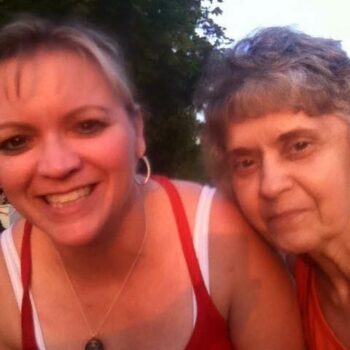Marie Temple

Although you may want a loved one with Alzheimer’s to remember his or her trip, Alzheimer’s patients often remember moment to moment. Try to make them feel as comfortable as possible because, even if they don’t remember the trip afterward, you will feel comforted knowing they were enjoying themselves at the time.
March 1st, 2018
Marie Temple is a full-time caregiver to her mother, Mary, who has Alzheimer’s disease.
My mother has moderate Alzheimer’s. She is 75 years old and began showing symptoms of Alzheimer’s disease about six years ago. We noticed that she began repeating herself often, but my father always said she would be OK. He never discussed my mother’s symptoms with us but after he suddenly passed away, we learned that he had already gotten her tested. I got the results, after he died and realized that I was losing my mother as well. It was like my world came crashing down on me, not once, but twice.
After my father’s sudden passing, my husband, children and I moved in with my mother, who could no longer care for herself. I was working full time in a position I had held for seven years. Because my husband does roofing and cannot work during the winter, he stayed with my mother for several months before he could return to work. I quit my job to take care of her full time because the money it cost to hire a certified nursing assistant (CNA) was more than I made at my job.
When you have a loved one with Alzheimer’s, it is important to ensure that the money and items he or she has worked so hard for are taken care of. My mother and I found attorneys who helped us develop a power of attorney, will, health proxy and a child-caregiver agreement.
Something else I have worked hard to maintain is my mother’s quality of life. There is a camp located near our house, so we take my mother camping every weekend between April and October in our camper. If your loved one is still in the moderate stages of Alzheimer’s, taking a trip—even locally—may benefit you both. Of course, if your loved one is in a more advanced stage of Alzheimer’s, a trip may not be feasible. I would offer the following advice to caregivers who want to take a trip with their loved one or who want him or her to spend more time socializing with others:
- Be prepared. Develop a checklist that includes everything you will need before you leave.
- Try not to expect too much from an Alzheimer’s patient after you return from a trip. Although you may want a loved one with Alzheimer’s to remember his or her trip, Alzheimer’s patients often remember moment to moment. Try to make them feel as comfortable as possible because, even if they don’t remember the trip afterward, you will feel comforted knowing they were enjoying themselves at the time.
- If you’re traveling with people your loved one hasn’t met before, tell them in advance that he or she has Alzheimer’s. My mother recognizes faces, but not names. The first time we took my mother camping with others, she had not previously met these friends. We told them she has Alzheimer’s, and they made her feel so welcome by calling her Mom the entire trip. Afterward, whenever I told her we were going to camp, she remembered that there were friends there, and she looked forward to going. Once she saw them, she reacted positively and enjoyed the experience.
- Caregivers may avoid taking their loved one with Alzheimer’s out in public, but I believe socialization is important. While I know part of the disease may cause Alzheimer’s patients to not want to socialize with others, I encourage my mother to go camping with us because I know that once she gets there, she’ll be fine. I noticed that since camp season has ended, my mother has regressed a bit, which illustrates the importance of socialization.
- Socialization is important for caregivers as well. Otherwise, you may go crazy. While there is not much time to socialize, I try to meet friends who are having similar experiences a few times a month. Meeting friends or even connecting with others on Facebook helps me feel more normal. Even if you don’t have anyone to help you, try to go into your room for a little while to read a book or watch a movie, after your loved one goes to bed.
Although others may be quick to judge your decisions, they are unaware of the road you are traveling on. Just remember that you are human, and that there are others who are on a similar journey.